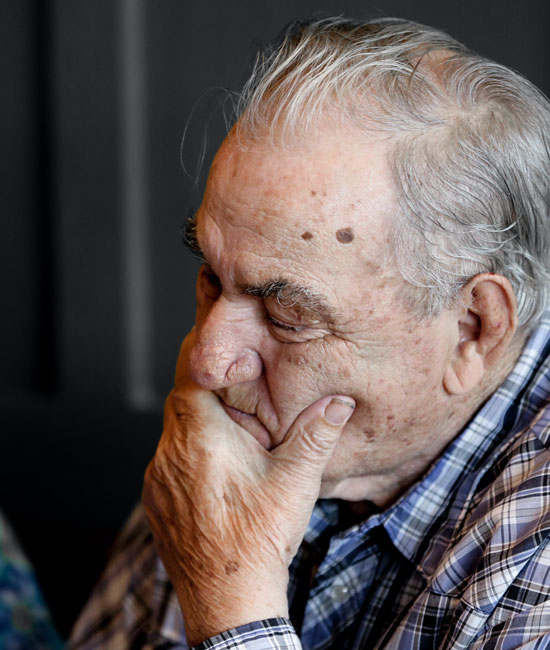Our senior citizens constitute a majority population and we welcome all who are interested in developing more effective ways of managing age-related challenges that can occur in geriatric life. We aim to ease the psychological pains of aging and soothe the transition of an individual to a restful period of life. Important areas addressed are dementia, elderly depression, anxiety etc. We can help you age gracefully.


Dementia And Cognitive Disorders
Dementia is the decline in cognitive functioning like thinking, remembering, and reasoning to Identifying cognitive impairment:
such an extent that it interferes with a person's daily life and activities. Dementia becomes more common as people age , but it is not a normal component of aging. Many people live well into their nineties and beyond without showing any signs of dementia.
The symptoms of dementia can vary and may include:
- Experiencing memory loss, poor judgment, and confusion
- Difficulty speaking, understanding and expressing thoughts, or reading and writing
- Wandering and getting lost in a familiar neighborhood
- Trouble handling money responsibly and paying bills
- Repeating questions
- Using unusual words to refer to familiar objects
- Taking longer to complete normal daily tasks
- Losing interest in normal daily activities or events
- Hallucinating or experiencing delusions or paranoia
- Acting impulsively
- Not caring about other people’s feelings
- Losing balance and problems with movement
- ACE-III
- MoCA
- MMSE
- NIMHANS Neuropsychological Battery
- Blessed Dementia Scale
- Psychoeducation to family members
- Cognitive Retraining
- Caregiver Management
- Pharmacotherapy

Mild To Moderate Cognitive Impairment
Cognitive impairment is when a person has trouble remembering, learning new things, concentrating, or making decisions that affect their everyday life. It ranges from mild to severe. With mild impairment, there are changes in cognitive functions, but they are still able to do their everyday activities. Severe impairment can result in the loss of comprehension, language, memory, planning and executive functioning.
- Memory loss.
- Frequently asking the same question or telling the same narrative over and over again.
- Unable to recognize familiar people and places.
- Having trouble exercising judgment, such as knowing what to do in an emergency.
- Changes in mood or behavior.
- Difficulty planning and carrying out tasks, such as following a recipe or keeping track of monthly bills.
- NIMHANS neuropsychological battery
- Weschler’s series
- Screening- ACE, MMSE
- Psychoeducation and supportive psychotherapy
- Cognitive retraining/ rehabilitation

Anxiety Disorders
Anxiety amongst the elderly is like that in the younger population—the individual experiences worry, fear, or doubt. However, it occurs more frequently and with greater intensity, typically along with other medical and psychological problems. Anxiety is often mistaken for a marker of aging rather than a source of distress. This is detrimental, as the illness can remain undiagnosed and cause further distress. Several things can contribute to an anxiety disorder like extreme stress or trauma, bereavement and chronic grief, etc.
Some symptoms, such as a sense of dread or doom, chest pain, and shortness of breath, nausea, and sweating, are like those of other anxiety disorders. Along with this, elderly anxiety has the following characteristics:
- Excessive worry or fear
- Refusing to participate in ordinary activities or being unduly engaged with them
- Unwillingness to leave their homes
- Overly concerned with safety, like being wary of unknown people accessing their homes and other heightened fears like burglary
- Sleep disturbances
- Fear of abandonment
- Memory loss
- Heightened levels of anxiety following the death of a spouse or loved one
- HAM – A
- BAI
- DASS
- State -Trait Anxiety Inventory ( STAI)
- MCMI
- Relaxation and mindfulness training
- Behavior Therapy
- Cognitive Behavior Therapy
- Solution Focused Brief Therapy
- Pharmacotherapy

Depressive Disorder
Depression is the most common mood disorder in later life. Geriatric depression is a condition that is rarely identified or addressed. There is a misconception that older people are depressed because they are ill or have lost their loved ones. Since typical symptoms like lack of appetite or sleep, weariness, and irritability can be a part of aging or physical problems connected with old age, it is often overlooked or difficult to diagnose.
Along with the common symptoms of depression, geriatric depression has some characteristic features, such as:
- Inability to remember events
- Unwillingness to interact with other people
- Changes in appetite and weight
- Frequent complaints about body ache and pain
- Loss of patience and frequently being irritated with family members
- Disturbed sleep and restlessness
- Depression can also co-exist with other chronic medical illnesses such as diabetes, hypertension, stroke, arthritis, cancer.
- Recurring thoughts of death or suicide
Geriatric depression can worsen the issues that come with aging. It’s not always easy to diagnose, but the right treatment can improve the quality of life significantly.
- Ham D
- BDI Beck’s depression inventory
- DASS
- MCMI – III
- Rorschach
- CBT
- behavioural activation
- Supportive psychotherapy
- Mindfulness therapy
- SFBT
- Pharmacotherapy

Somatoform Disorders
Disorders which are characterized by the presence of multiple and recurring physical symptoms, suggesting a physical illness but without any evidence of physical illness on clinical assessment and evaluation. The patient appears very depressed.
Common symptoms related to various bodily systems are:
- Gastrointestinal symptoms like abdominal pain, nausea, vomiting
- Neurological symptoms include fainting, pseudoseizures, loss of voice, difficulty in swallowing.
- Cardiopulmonary symptoms like chest pain, breathlessness.
- Pain symptoms include joint pain, back pain etc.
They describe in an emotional, and exaggerated manner, using vivid and colourful language.
- HAM – A
- BAI
- DASS
- State -Trait Anxiety Inventory ( STAI)
- MCMI
- Relaxation and mindfulness training
- Behavior Therapy
- Cognitive Behavior Therapy
- Solution Focused Brief Therapy
- Pharmacotherapy

Obsessive-compulsive Disorder
Obsessive-compulsive disorder (OCD) is characterized by recurrent unwanted thoughts (i.e., obsessions) and consequent repetitive behaviors (i.e., compulsions). Obsessive-compulsive disorder is usually considered a lifelong anxiety disorder, but when an elderly person develops symptoms later in life, it could be related to the onset of Alzheimer’s disease or another type of dementia.
- Fear of germs or contamination
- Unwanted forbidden thoughts involving sex, religion, or harm
- Aggressive thoughts towards others or self
- Having things symmetrical or in a perfect order
The person may have a habit of doing certain repetitive behaviors to do away with obsessive thoughts. Examples of such compulsive actions are:
- Excessive cleaning and/or handwashing
- Ordering and arranging things in a particular, precise way
- Repeatedly checking on things, such as repeatedly checking to see if the door is locked or that the oven is off
- Compulsive counting
- Y-BOCS Checklist and Severity Rating Scale
- HAM – A
- BAI
- DASS
- State -Trait Anxiety Inventory ( STAI)
- MCMI
- Relaxation and mindfulness training
- Behavior Therapy
- Cognitive Behavior Therapy
- Solution Focused Brief Therapy
- Pharmacotherapy

Delusional Disorder
Delusional disorder is a disorder where the affected individual has trouble recognizing reality. A delusion is actually a false belief that is based on an incorrect interpretation of reality. Though delusions can occur as part of many different psychiatric disorders, the term delusional disorder is used in cases where delusion is the most prominent symptom.
Delusions can also accompany other disorders such as dementia of the Alzheimer's type, alcohol use disorders, schizophrenia, depressive disorders, and bipolar I disorder, all of which must be ruled out.
- Preoccupation with a false fixed belief
- Behavior unrelated to the delusion is often normal
- Secondary to the delusion often depressive symptoms are present
- Aggressive / assaultive behavior in severe cases
- BABS
- BPRS
- MCMI III
- Rorschach
- CBT
- MCT
- Pharmacotherapy
